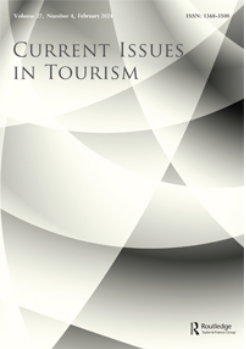危机驱动的居民亲旅游行为转变
IF 4.6
3区 管理学
Q1 HOSPITALITY, LEISURE, SPORT & TOURISM
引用次数: 0
摘要
经济危机显著地塑造了居民对旅游的看法,影响了他们支持或反对旅游的行为。本研究将社会交换理论与韦伯理论相结合,探讨经济危机感知如何影响居民对旅游中经济和非经济价值的优先排序。通过对两个伊朗历史旅游目的地(伊斯法罕和设拉子)的多群体分析(MGA),我们发现较高的PEC水平与对旅游业的积极态度和对其增长的支持相关。更重要的是,经济效益、心理赋能、社会赋能、居民感知和亲旅游行为之间的结构关系因居民经济赋能水平的不同而存在差异。这些发现揭示了PEC、居民感知和亲旅游行为之间微妙的相互作用。关键词:亲旅游发展行为经济危机社会交换理论韦伯形式与实质理性理论可持续发展披露声明作者未报告潜在利益冲突本文章由计算机程序翻译,如有差异,请以英文原文为准。
Crisis-driven shifts in resident pro-tourism behaviour
ABSTRACTEconomic crises significantly shape residents’ perceptions of tourism, impacting their pro- or anti-tourism behaviours. This study integrates social exchange theory and Weber's theory to explore how perceived economic crisis (PEC) influences residents’ prioritization of economic and non-economic values in tourism. Using multigroup analysis (MGA) in two historical Iranian destinations (Isfahan and Shiraz), we find that higher PEC levels correlate with more positive attitudes towards tourism and support for its growth. More importantly, the structural relationships among economic benefit, psychological empowerment, social empowerment, resident perception, and pro-tourism behaviour, differed across residents due to varying levels of PEC. These findings shed light on the nuanced interplay between PEC, residents’ perceptions, and pro-tourism behaviours.KEYWORDS: Pro-tourism development behavioureconomic crisissocial exchange theoryWeber’s theory of formal and substantive rationalitysustainable development Disclosure statementNo potential conflict of interest was reported by the author(s).
求助全文
通过发布文献求助,成功后即可免费获取论文全文。
去求助
来源期刊

Current Issues in Tourism
HOSPITALITY, LEISURE, SPORT & TOURISM-
CiteScore
15.50
自引率
10.00%
发文量
230
期刊介绍:
Journal metrics are valuable for readers and authors in selecting a publication venue. However, it's crucial to understand that relying on any single metric provides only a partial perspective on a journal's quality and impact. Recognizing the limitations of each metric is essential, and they should never be considered in isolation. Instead, metrics should complement qualitative reviews, serving as a supportive tool rather than a replacement. This approach ensures a more comprehensive evaluation of a journal's overall quality and significance, as exemplified in Current Issues in Tourism.
 求助内容:
求助内容: 应助结果提醒方式:
应助结果提醒方式:


